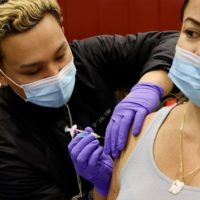
Samara Heisz/iStock(NEW YORK) — When Carl Goldman and his wife Jeri embarked on a vacation cruise on the Diamond Princess, he had no idea he would end his trip surrounded by doctors in hazmat suits in a biocontainment unit in Nebraska.
Along with the rest of the cruise ship’s passengers and crew, the Goldmans were thrown into quarantine, during which more and more people became infected with novel coronavirus, officially known as COVID-19.
The virus spread rapidly throughout the ship as it sat docked on the coast of Japan, prompting the U.S. government to evacuate a number of Americans who were on board.
During that evacuation, the Goldmans’ diagnostic tests came back: Jeri tested negative for the virus. Carl, 66, tested positive.
COVID-19, which is in the same family as SARS, MERS and the common cold, can trigger mild symptoms, such as a sore throat or slight cough, or it can be severe, including fever and shortness of breath. In the most serious cases, patients require a respirator in order to breathe.
The virus tends to be more serious in older adults and in those with underlying health conditions. Based on data out of China, where the majority of novel coronavirus deaths have occurred, about 2% of cases are fatal.
Here’s Carl’s account of what having COVID-19 is like:
After staying up all night and being loaded onto a 747 cargo plane bound for the United States, Carl immediately went to sleep.
“When I woke up about two hours later, I knew I had a high fever,” Carl, who owns a radio station in Santa Clarita, California, told ABC News’ World News Tonight.
“My wife touched me and she knew I was burning up. I went up to the military doctors, they took my temperature and immediately put me in a quarantine area,” he said.
Upon landing in Omaha, Nebraska, on Feb. 17, Carl was transported via stretcher and ambulance to the biocontainment unit at the University of Nebraska’s Medical Center, an experience he described as a whirlwind “processional” of ambulances, military vehicles, first responders and federal marshals.
Any staff that Carl interacts with these days is outfitted in a hazmat suit.
“I have a window I’m looking out here on the left,” he explained. “I have windows on the right, but it’s all double-pane thick glass. The doors are specially sealed, so I kind of feel like I’m a fish inside a fish inside a bowl.”
He described his symptoms, including coughing up mucus, as mild.
“The good news is my fever broke by the time I came to the hospital. I had a little fever, mild fever the first day. And then over a night ago, I had a little fever as well, that just came for about an hour and then disappeared,” he said.
Doctors continue to take his temperature every three hours.
“I think the biggest fear, particularly with this virus, is getting dehydrated,” Carl said.
Since there’s no proven treatment for novel coronavirus yet, doctors have been offering Carl over-the-counter options.
“The one thing they have been giving me is Gatorade,” he said. “I’ve got Gatorade in every single flavor.”
Once Carl’s symptoms clear, doctors will do swab tests until he repeatedly tests negative for COVID-19. Then he hopes to fly back to Los Angeles.
Until he’s cleared to leave, Carl is doing breathing exercises recommended by his doctors and walking around his room to keep circulation flowing, he said. He’s also taking advantage of the hospital’s meal service.
“I just finished a delicious lunch of a grilled cheese. I’m looking forward to a cheeseburger tonight and baked potato,” he said.
“I believe it’s set up 24/7, so I could have a midnight snack if I wanted to,” he said.
Copyright © 2020, ABC Audio. All rights reserved.















